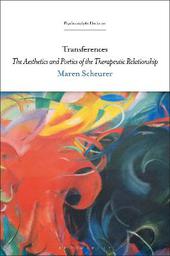
|
Transferences: The Aesthetics and Poetics of the Therapeutic Relationship
Paperback / softback
Main Details
| Title |
Transferences: The Aesthetics and Poetics of the Therapeutic Relationship
|
| Authors and Contributors |
By (author) Dr. Maren Scheurer
|
| Series | Psychoanalytic Horizons |
|---|
| Physical Properties |
| Format:Paperback / softback | | Pages:336 | | Dimensions(mm): Height 216,Width 140 |
|
| Category/Genre | Television
Literary theory
Literary studies - general |
|---|
| ISBN/Barcode |
9781501381447
|
| Classifications | Dewey:700.105 |
|---|
| Audience | | Professional & Vocational | |
|---|
|
Publishing Details |
| Publisher |
Bloomsbury Publishing Plc
|
| Imprint |
Bloomsbury Academic USA
|
| Publication Date |
22 April 2021 |
| Publication Country |
United States
|
Description
Why are psychoanalysts fascinated with literature and other arts? And why do so many novels, plays, films, and television series feature therapy sessions? Transferences investigates the interdisciplinary attraction between psychoanalysis and the arts by exploring the therapeutic relationship as a recurring figure in psychoanalytic discourse, literature, theater, and television. In addition to close readings of psychoanalytic and critical texts, the book presents a new approach to examining psychoanalytic themes and formal devices in texts like Philip Roth's Portnoy's Complaint, J. M. Coetzee's Life & Times of Michael K, Margaret Atwood's Alias Grace, Peter Shaffer's Equus, and the HBO series In Treatment. Transferences argues that psychoanalysts as well as writers and other artists are fascinated by the therapeutic relationship because it provides a unique site to negotiate the narrative and artistic underpinnings of psychoanalysis and reflect and reinvent the aesthetic and poetic potentiality of art.
Author Biography
Maren Scheurer is a Researcher and Lecturer in Comparative Literature and English Studies at Goethe University Frankfurt, Germany. She is executive co-editor, with Aimee Pozorski, of Philip Roth Studies.
ReviewsMaren Scheurer has written a fascinating study of the central role of transference in the complex interactions among psychoanalysis, literature, theater, and television. She succeeds admirably in her analysis of literary and filmic representations of psychoanalysis. She writes authoritatively, yet she is never authoritarian or dogmatic. Transference is a pioneering study of the relationship between psychoanalysis and the arts. * Jeffrey Berman, Distinguished Teaching Professor of English, University at Albany, State University of New York, USA * Maren Scheurer holds the theoretical, poetic, and emotional in a marvelously creative tension in this ambitious, engaging, and wide-ranging study. The central psychoanalytic concept of 'transference' is opened up to reveal the many potential transformations (and 'transferences') through and across the arts and psychoanalysis as therapeutic practice. Scheurer encourages us to think about creativity, and its crises, the anxiety of interpretation, and also of critique; above all, to enjoy the (as yet unknown) possibilities offered by relational dynamics. As the character Gina, from the TV series In Treatment, says: 'you can't observe yourself through your own binoculars.' The study will be of interest to academic researchers and clinical practitioners; but also, I think, to anyone interested in human relations, stories, and storytelling. * Susan Bainbrigge, Senior Lecturer in French and Francophone Studies, University of Edinburgh, UK * The comparisons and contrasts that Scheurer draws between psychoanalysis and literary, theatrical, film, and television art are extensive, penetrating, and insightful. One distinctive feature of this book is the painstaking and fascinating detail the author brings to the task of showing how psychoanalysis and the above-mentioned art (which she refers to as the humanities) illuminate each other, creating a synergetic 'third' between them that furthers the legitimacy of each while reinstating the irreplaceable importance of subjective narratives. I would expect this book to excite the interests of literary and film scholars, students and critics as well as psychoanalysts, psychotherapists and professors of psychology, as it delineates several intriguing perspectives around 'story telling' and narration in general. * Danielle Knafo, Professor of Clinical Psychology, Long Island University, USA *
|